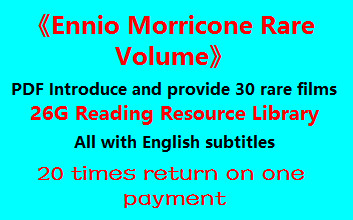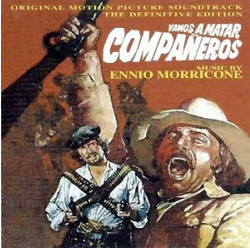VAMOS A MATAR COMPAÑEROS (1970)
Vamos a Matar Compañeros is an action/comedy spaghetti western directed by Sergio Corbucci, starring Franco Nero, Tomas Milian, Jack Palance, and Fernando Rey. The film is set during the Mexican revolutionary war and follows the adventures of Yodlaf Peterson, a Swedish arms dealer and mercenary, who teams up a poor revolutionary named El Vasco; their adventure involves them travelling across Mexico to break a fellow revolutionary – a well-educated Professor – out of an American army jail, as the Professor is the only person who knows the combination to a safe which contains a large amount of money. The film was the fifth of Corbucci’s popular spaghetti westerns after Navajo Joe, I Crudelli, Il Mercenario, and Il Grande Silenzio, and was a cult international hit upon its release.
Morricone’s score for Vamos a Matar Compañeros is one of my all-time favorites by him, because it combines the sublimely beautiful with patently stupid and hilarious, all to astonishingly entertaining effect. The first time I heard the titular song, which has Spanish lyrics by director Corbucci, I literally burst out laughing. It’s an insanely catchy and fast cowboy clip-clop rhythm which uses a trilling recorder, a harmonica, and tolling bells in between vocal passages that gradually become louder, higher, and more shrill with each successive verse. When the vocalist literally shrieks – “aaaaaaaaaarghhhh!” – at the 1:21 mark, you can’t help but fall in love with the absurdity of it all. The fact that this song was written by the same man who wrote Gabriel’s Oboe and Deborah’s Theme is testament to Morricone’s genius. No one wrote music like him, with this much innovation, this much style, and this much humor.
The second theme relates to Nero’s character, “Il Pinguino,” and is a laid-back piece for a plucked guitar and Alessandro Alessandroni’s iconic whistling; it’s perfect depiction of the character – simple, nonchalant, without a care in the world; it reminds me a little of the music Burt Bacharach wrote for Butch Cassidy and the Sundance Kid in 1969, to the extent I actually wonder whether it was temp-tracked. The rest of the score is made up mostly of variations on these two themes, with some of the versions of the Pinguino theme receiving a very satisfying re-orchestration where the melody is carried by a solo trumpet.
Of the other cues include “La Loro Patria,” the main romantic piece, a slow and hesitant piece for strings, strummed guitars, and woodwinds, which at times becomes quite sweeping and moving on the few occasions the full orchestra rises to carry the melody. “Un Uomo in Agguato” is a classic piece of Morricone suspense music, full of insistent jangling guitars and jagged percussive textures, which becomes powerfully dramatic when the rasping brass and open voices take over. “La Messicana” is a lovely, gentle piece that yearns for the Mexican homeland and features a rich harmonic solo.
If I’m ever in a bad mood I put on Vamos a Matar Compañeros and I immedialy feel better. You can help but smile while listening to this score. Quite how Morricone came up with the idea to combine abstract and angular action music with carefree whistling and that song to convey a story about the Mexican revolutionary war and missing gold will never be anything but astonishing to me, but that’s what made him who he was. I like the release from Screentrax that came out in 2000, but there are multiple options to choose from. Whichever one you can find, this one is not to be missed.
Track Listing: 1. Vamos A Matar Compañeros (2:21), 2. Il Pinguino (2:52), 3. La Messicana (2:36), 4. La Loro Patria (1:38), 5. Un Uomo in Agguato (5:36), 6. Pensando Alla Libertá (1:18), 7. Cecchino (1:19), 8. Il Pinguino #2 (2:59), 9. Vamos A Matar Compañeros #2 (2:02), 10. Il Pinguino #3 (1:59), 11. Un Uomo in Agguato #2 (4:02), 12. Il Pinguino #4 (2:29), 13. La Loro Patria #2 (3:56), 14. Vamos A Matar Compañeros #3 (3:22), 15. Un Uomo in Agguato #3 (3:32), 16. Il Pinguino #5 (2:05), 17. Vamos A Matar Compañeros #4 (3:54), 18. La Loro Patria #3 (3:13), 19. Vamos A Matar Compañeros #5 (1:50), 20. Vamos A Matar Compañeros #6 (6:17). Screentrax CDST-327, 59 minutes 20 seconds.












